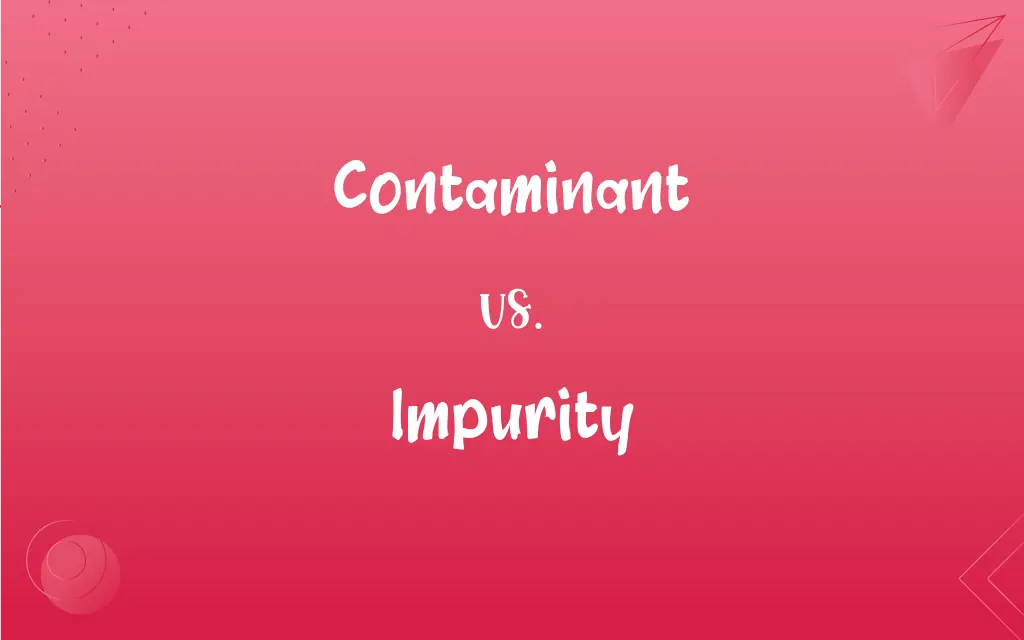Contaminant vs. Impurity: What's the Difference?
Edited by Harlon Moss || By Janet White || Published on October 11, 2023
A contaminant is an unwanted substance causing harm or pollution, whereas an impurity is an unintended, inferior substance present in another substance.

Key Differences
A contaminant refers to any unwanted or harmful substance that degrades the purity of air, water, food, or any other element, often causing harm or affecting the quality adversely. Contaminants can be physical, chemical, or biological and often result from human activities or environmental factors. On the other hand, an impurity is any foreign substance within a mixture or compound that is not intended to be there. Impurities can arise during the production or storage of a substance and may or may not affect the substance's utility or harm the user.
The presence of contaminants typically results in pollution and can pose significant health and environmental risks. Contaminants can be hazardous and are usually unintended in the substance, necessitating removal or treatment to avoid harm. Impurities, in contrast, can exist in various forms, such as additives in metals or unintended by-products in chemical reactions, and may or may not be detrimental depending on their nature and concentration.
While contaminants inherently imply harm or undesirability, impurities do not always have a negative connotation. Some impurities do not impact the functionality or quality of the main substance and may even be necessary for certain reactions or processes. However, contaminants are always undesirable due to their harmful effects on health and the environment and need to be controlled or eliminated.
The distinction between a contaminant and an impurity often lies in their origin and effect. Contaminants are usually external substances that infiltrate a system or environment, causing adverse effects, while impurities are often inherent components or by-products of a substance's production process. While impurities may sometimes be neutral or beneficial, contaminants are generally harmful and undesirable.
Both contaminants and impurities are significant in different contexts, and their management is crucial. Contaminants need immediate addressing due to their adverse effects on health and the environment, while impurities require analysis and control to maintain the quality and integrity of products and substances.
ADVERTISEMENT
Comparison Chart
Nature
Unwanted, harmful substance.
Unintended, foreign substance.
Connotation
Generally negative, implies harm.
Neutral, may or may not be harmful.
Origin
Typically external infiltration.
Often inherent or a by-product.
Impact
Causes pollution, affects health.
Affects the quality or utility.
Removal or Management
Essential due to harmful effects.
Necessary depending on the nature.
ADVERTISEMENT
Contaminant and Impurity Definitions
Contaminant
A harmful, alien substance in a natural environment.
The scientist found a high level of chemical contaminants in the soil sample.
Impurity
A foreign substance mixed with another substance, diminishing its purity.
The gold had a high level of impurity and needed refining.
Contaminant
An unwanted substance that pollutes or contaminates.
Industrial waste is a major contaminant in rivers.
Impurity
Any substance found within another substance that is not a component of the original substance.
The chemical analysis revealed several impurities in the compound.
Contaminant
A substance that is in a place where it should not be and is unwanted.
The filter removes contaminants from the air effectively.
Impurity
The quality or condition of being mixed with foreign or contaminating substances.
The water was treated to remove any impurity.
Contaminant
Any foreign impurity in a substance that reduces its purity and quality.
Lead is a dangerous contaminant in drinking water.
Impurity
Any component that is not the desired or intended substance.
The presence of impurity affected the reaction rate.
Contaminant
Something that causes impurity; a polluting or poisonous substance.
The water supply was tested for potential contaminants.
Impurity
Contamination or pollution.
Contaminant
One that contaminates.
Impurity
Lack of consistency or homogeneity; adulteration.
Contaminant
That which contaminates; an impurity; foreign matter.
Put the lid on the jar to keep contaminants out.
Impurity
A state of immorality; sin.
Contaminant
A substance that contaminates
Impurity
Something that renders something else impure; an inferior component or additive.
Impurity
The condition of being impure; because of contamination, pollution, adulteration or insufficient purification.
Even animals in the Jewish system cause impurity only when they are dead.
Impurity
A component or additive that renders something else impure.
The impurities in the iron ore made extraction of the iron very difficult.
Impurity
A state of immorality or sin; especially the weakness of the flesh: inchastity.
With his cheating, lying and stealing, he epitomised the impurity of humanity.
Impurity
The condition or quality of being impure in any sense; defilement; foulness; adulteration.
Profaneness, impurity, or scandal, is not wit.
Impurity
That which is, or which renders anything, impure; foul matter, action, language, etc.; a foreign ingredient.
Foul impurities reigned among the monkish clergy.
Impurity
Lack of ceremonial purity; defilement.
Impurity
Worthless material that should be removed;
There were impurities in the water
Impurity
The condition of being impure
Impurity
An unwanted element present within a substance, affecting its quality.
The scientist was able to isolate the impurities from the sample.
FAQs
Can impurities be beneficial?
Yes, some impurities can be beneficial or neutral, affecting neither quality nor functionality.
Can impurities be intentional?
Generally, impurities are unintentional, but some substances may have intentional additives that could be considered impurities in other contexts.
Can a contaminant be a component of the original substance?
No, contaminants are typically foreign substances that are not originally part of the substance.
Are all contaminants impurities?
Not necessarily, as impurities are specific to mixtures or compounds, while contaminants can be in any medium, like air or water.
Is it possible for a substance to have no impurities?
In theory, yes, but in practice, achieving absolute purity is extremely difficult.
Are impurities always undesired?
Not always, some impurities do not affect the quality or may even be necessary for certain processes.
Can impurity affect the color of a substance?
Yes, impurities can change the color, texture, and other physical properties of a substance.
Can an impurity be removed?
Yes, impurities can often be removed or reduced through various purification processes.
Is a contaminant always visible?
No, contaminants can be microscopic or in molecular form and may not always be visible.
Is contamination always harmful?
Typically, contamination implies harm or undesirability due to the presence of contaminants.
Can a contaminant alter the state of a substance?
Yes, depending on its nature and quantity, a contaminant can alter the physical or chemical state of a substance.
What is the impact of contaminants on the environment?
Contaminants can have detrimental effects on ecosystems, affecting air, water, soil quality, and the organisms living within them.
Are contaminants naturally occurring?
They can be; both natural and anthropogenic (human-made) contaminants exist.
Can impurities be added deliberately?
While impurities are generally unintended, additives, which are similar, can be added deliberately.
Are contaminants only chemicals?
No, contaminants can be biological, physical, or chemical in nature.
About Author
Written by
Janet WhiteJanet White has been an esteemed writer and blogger for Difference Wiki. Holding a Master's degree in Science and Medical Journalism from the prestigious Boston University, she has consistently demonstrated her expertise and passion for her field. When she's not immersed in her work, Janet relishes her time exercising, delving into a good book, and cherishing moments with friends and family.
Edited by
Harlon MossHarlon is a seasoned quality moderator and accomplished content writer for Difference Wiki. An alumnus of the prestigious University of California, he earned his degree in Computer Science. Leveraging his academic background, Harlon brings a meticulous and informed perspective to his work, ensuring content accuracy and excellence.








































































